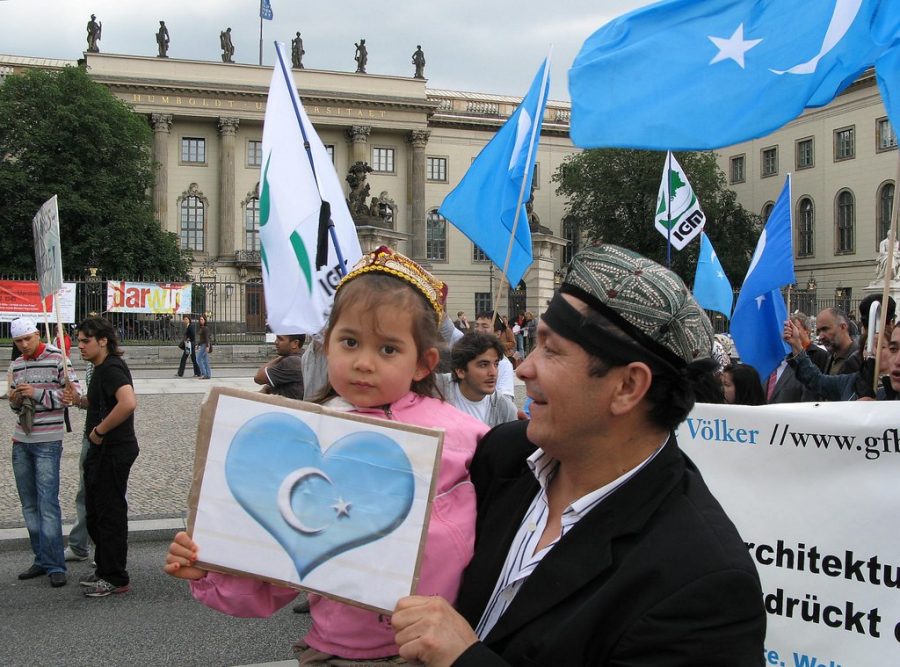Uighurs Oppressed in China
langkawi
A young girl holds up a sign supporting Uighurs in China. Criticism of the Chinese government’s oppression of Uighurs has been increasing internationally. Photo courtesy of langkawi.
May 20, 2021
Uighurs are a group of Muslim Turkic people that consider themselves close to the culture and ethnicity found in Central Asia. They have their own language and a distinct culture. Early in the 20th century Uighurs were able to declare their independence from China. Their independence was brief, in 1949 the Chinese Communist party repossessed the Uighurs.
“There is mass detention of Uighurs, ethnic Kazakhs, and members of other Muslim minority groups in the Xinjiang Uighur Autonomous Region (Xinjiang),” former Deputy Assistant Secratary of State Scott Busby said in a written document to the Senate Foreign Relations Committee.
Experts say that since 2014, Uighur Muslims have been increasingly oppressed by the Chinese government. The problem, however, was not known until the end of 2018. Due to the Chinese government refusing to cooperate and provide information to international organizations, the situation had been hidden from the world. Since the situation has come to light, the United Nations (UN) has been working with China to stop the cultural oppression.
“China’s repressive policies toward minority Muslim groups have spread hundreds of miles away to Hui Muslim communities with plans to shut down mosques in the Ningxia Hui Autonomous Region,” Mr. Busby said.
In 2017, General Secretary Xi Jinping issued a directive that all religions must be of “Chinese orientation” and adapt to a socialistic society. By “Chinese orientation,” the government is referencing the five religions accepted and recognized in the country including Taoism and Buddhism. This directive affected the Uighurs greatly by causing further crackdowns against their people and religion. Uighurs are facing religious discrimmmination and are not being allowed to fast during Ramadan, visit Mosques and openly practice their religion. Xianjang has become a surveillance hub with machines everywhere that scan peoples faces and license plates. There are also ID checkpoints throughout the city and police patrolling through the city.
“Freedom is only possible when this ‘virus’ in their thinking is eradicated and they are in good health,” Mr. Xi said in secret speeches transcribed into official documents about the Uighur eradication in China leaked by a Chinese party official.
The Chinese Muslims are being put into detention camps that are being compared to the ones experienced by Jews during the Holocaust. The camps, however, are referred to as “re-education camps” by China, which claims they are “vocational education and training centres” that “rehabilitate” people that were convicted for minor offenses. The true nature of these “training centers” can be seen by the documents that have been released by the Chinese government revealing the “necessary” materials bought by the officials running the camps.
“I was immediately struck by how many camps there were, how large, and how quickly they are growing. In a matter of months they are throwing up five-story buildings, longer than football fields, lined up in rows in the desert,” Edward Boyda, the co-founder of Earthrise Media, an investigative practice that uses satellite technology to fight for human rights said to Reuters Investigates.
The documents show that 2,768 police batons, 550 electric cattle prods, 1,367 pairs of handcuffs, and 2,792 cans of pepper spray were bought for use in the camps. Along with this, another leaked document reveals how the Chinese government is hoping to “rehabilitate” the people in these camps.
“The centres must first break their lineage, break their roots, break their connections, and break their origins,’” Xinjiang Party Secretary Chen Quanguo said in an official document about the functionality of the centers that was leaked.
The Chinese government maintains that its actions against the Uighur people do not constitute an infringement on human rights. According to China, these crackdowns are warranted due to violence and terrorism in the region at the hands of Uighur rebels, despite the fact that no threat exists from any rebel group in the region. In the last few years, there has been one protest that turned violent, but only after the government interfered. The Chinese government has accused the Uighur people of crimes like attending services at mosques and sending texts with Quranic verses.
“There were so many things to recite, and if you couldn’t recite them, they wouldn’t allow you to eat, sleep or sit. They brainwash you; you must become like a robot. Listen to whatever the party says, listen to the party’s words, follow the party,” Omir Bekali, a survivor of the internment camp, said to The Washington Post.
The information on what exactly is happening inside the camps is very limited due to China’s high levels of secrecy. Detainees that were released described experiencing torture, sleep deprivation, and prison-like surveillance with microphones and cameras recording their every move.
“Further disobedience would result in waterboarding or long periods strapped in agony in a metal contraption known as a “tiger chair,” Kayrat Samarkand, another former prisoner, said to The Washington Post.
Women reported experiencing sexual abuse and being forced to have contraceptives put in or abortions against their will. Women experienced sexual humiliation as well, with prisoners being filmed while showering and violated with chile paste put on their genitalia. The abuse is China’s attempt to control reproduction by making it impossible for these women to have children. There are also reports of guards watching women through their cameras and then choosing which ones they wanted to sexually abuse.
“Sexually violating women, including stopping them from reproducing, has become a weapon for China against its Muslim population,” Aiman Umarova said to The Washington Post.
The UN, human rights activists, the US, and many other groups are calling for China to stop their campaign of cultural genocide against the Uighurs. The US has already put sanctions on China in attempts to get it to stop. In addition to the sanctions the Trump Administration had blacklisted over 24, Chinese companies and agencies associated with abuses of the Uighur people. Last month the first actions by Biden’s Administrations were taken by sanctioning two Chinese officials due to their roles in the crisis occurring in China. According to the Department of Treasury China’s Wang Junzheng, the Secretary of the Party Committee of the Xinjiang Production and Construction Corps, and Chen Mingguo, director of the Xinjiang Public Security Bureau were sanctioned because of their connections with the abuses facing Uighur Muslims in China.
“The United States continues to advocate for human rights in China, our bureau is implementing $10 million of FY2018 Economic Support Funds for human rights in China,” Mr. Busby said in a testimony, at a government hearing regarding the crisis. “This funding will support programs that improve rights awareness, strengthen citizen participation in policy formation, promote transparency and accountability, increase the ability of rights-focused civil society groups to work together, promote internationally recognized labor rights, and engage on rights-focused issues of broad concern to the Chinese public.”
Allies of China have been silent, prioritizing their economic relationships. A letter to the UN human rights chief was signed in 2019 by a group of mostly European countries, none of which were Muslim-majority, berating China’s actions in Xinjiang in efforts to take actions against the genocide. After this more than thirty-six states, including Pakistan and Saudi Arabia, signed an opposing letter commending China’s “remarkable achievements” in human rights and its “counterterrorism” efforts in Xinjiang.



